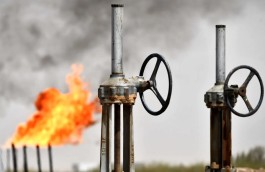Oil prices rose on Wednesday, adding to sharp gains in the previous session after Iran launched a missile attack on Israel, escalating tensions and potentially disrupting crude production from the volatile region.
At 13:15 Riyadh time, WTI crude oil rose 3% to $72 per barrel, and Brent crude prices rose 2.87% to $75.67 per barrel.
Crude rises after Iranian missile attack on Israel
Both benchmarks gained more than 5% on Tuesday following Iran's largest-ever military strike against Israel in retaliation for the killing of Iran-backed Hezbollah leader Hassan Nasrallah and Israel's deployment of ground troops into southern Lebanon.
Iran said its offensive was over, provided Israel did not respond or renew its provocations. Iran's UN envoy said any Israeli response to the retaliatory strike for the assassination of Hamas leader Ismail Haniyeh in Tehran would be met with widespread destruction, potentially dragging Israel's backer the United States into the turmoil.
“So far, many market participants have dismissed the risk of physical supply disruptions from the nearly year-long conflict, while Iranian exports have risen to 1.7 million barrels per day, almost their highest in six years,” analysts at RBC Capital Markets said in a note.
RBC added: “Iran has so far avoided a repeat of the 2019 attacks on regional energy infrastructure. However, Iran and its proxies are likely to target energy operations in other parts of the region in order to internationalize the cost if the current crisis turns into a full-scale war.”
In addition, Israel may choose to escalate beyond its traditional response of targeting military infrastructure.
“A major escalation would likely involve targeting Iran’s nuclear facilities and energy infrastructure, which would likely boost the risk premium priced into the oil market,” analysts at ING said in a note.
OPEC+ unlikely to change output
Members of the Organization of the Petroleum Exporting Countries and its allies, a group widely known as OPEC+, will meet later in the session to review the market.
The group is set to raise production by 180,000 barrels per day each month, starting in December, so little change is expected at this meeting.
ING added: Given that a handful of OPEC+ members have previously agreed to continue their full additional voluntary cuts until the end of November, we do not expect the committee to recommend any change in production policy.
US crude inventories fall - API
U.S. crude inventories fell by about 1.46 million barrels for the week ended Sept. 27, according to data from the American Petroleum Institute, released Tuesday, compared with a draw of 4.3 million barrels the previous week.
Economists had expected a decline of about 2.1 million barrels.
Gasoline stocks rose by about 909,000 barrels, while distillate stocks - the fuel category that includes diesel and heating oil - fell by about 2.67 million barrels.
The official government inventory report is due later in the session.






































